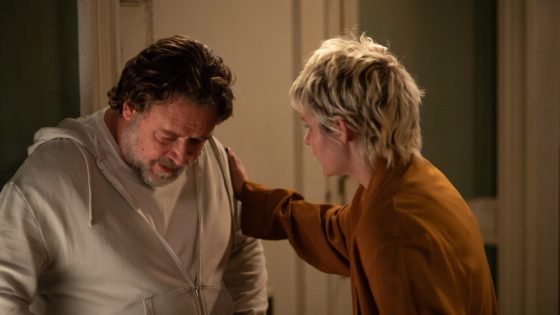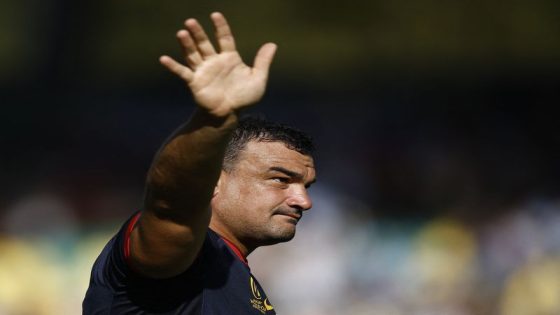Joshua John Miller and his personal and creative partner, M.A. Fortin, never set out to make a movie about an exorcism because, as Fortin says to Miller, “Your father stars in the greatest one of all time.”
Miller’s dad was the actor Jason Miller, who played Father Damien Karras in “The Exorcist.” He often told Joshua stories of the purportedly haunted set, recounting fires that started around the production and the injuries and deaths that would impact those who worked on the film.
That real-life experience was one of the big inspirations for “The Exorcism,” a new movie Joshua directed and co-wrote with Fortin, in which Russell Crowe plays Anthony Miller, an actor portraying a priest in what looks to be a modern “Exorcist” remake while living with his estranged daughter Lee (Ryan Simpkins).
Although the meta parallels are on display — from the father’s problems with alcohol to the family’s last name “Miller” — Joshua and Fortin wanted to use the story as a springboard to cover more ambitious themes.
“There was just something about the time and the personal and professional experiences that we’d undergone,” Fortin said. “The language of exorcism movies suddenly felt weirdly compelling to us — the fact that they’re all the same sort of verse, chorus, verse, where the Catholic Cortana is inviolable, perfect and it will save you. Also, women are always the ones you know who are going to be possessed because they’re receptive — it’s very sexist.
“Also, there seems to be a kind of nastiness that has been unleashed, and it seemed at the time specifically that men were the ones who were especially receptive to and susceptible to it,” he continued. “It made us wonder how we could fuck around with the exorcism genre. Also as queer people, we’ve been a couple for 20 years, and I specifically had some nuns in my background for a hot minute. I’ve always had a tenuous relationship with the Church and with its relationship towards queer people.”
Joshua John Miller, left and M.A. Fortin
Armed with all of those ideas, the pair decided to build the narrative around an in-story set that is combative and ultimately destructive for Anthony. Previously, Joshua and Fortin’s biggest projects together were creating the USA Network crime series “Queen of the South” and writing the 2015 horror comedy “The Final Girls,” which gave them plenty of experience with caustic personalities in the industry.
“[Fortin] and I had a professional experience years ago on a project,” Joshua said. “It was so traumatizing and emotionally violent that it shook up our world in an extreme way. I guess you could say we saw the devil. In that moment, you either grow from that experience or you shrink. I think that made its way into this movie a lot, subconsciously.”
The duo was unafraid to look directly into the darkness with their script, which speaks frankly about issues including addiction, which Joshua spent much of his life watching his father contend with.
“I think the idea of writing about addiction is rooted in our own experiences and the people around us,” Joshua said. “As a kid, I was witnessing my dad’s deep, painful struggle with addiction. That was very present in my life for me, probably too much to be quite honest. But it taught me to want to be the better variation, the better version. My father came from a time that romanticized indulgence — ‘that’s what artists did.’”
Those difficult, masculinity-examining conversations manifest in other areas of the script as well, such as scenes when a character’s abuse at the hands of the Church is discussed — not standard fare for a typical horror movie.
“In terms of traumas, I think that’s not something people expect in a horror film, per se,” Joshua said. “I think most studios want to have jump scares only and a semblance of pathos. From the beginning, we always knew we were going to fight for the emotionality. If you have that, then you’ll be more scared, you’ll be more invested. It’s always been about focusing on the characters and relationships.”
Another area Joshua and Fortin wanted to examine was Lee’s budding lesbian relationship with a young actress on set, played by Chloe Bailey.
“Growing up, there was a certain segment of Judeo-Christians that could not talking enough about how queer people were either damned or outright evil,” Fortin said. “There is something so disfiguring about having to grow up in that. It feels huge to me that a pop movie that is so much a Catholic story also centers young queer women as being simply on the side of good. It argues — quietly, without politicizing it — that two queer women are part of God’s plan and not anything else. It’s a small thing, but it just feels important to us.”
Joshua held firm too when he had to fight to keep in a brief love scene between the two characters.
“At one point, someone said, ‘Well, it’s not “Euphoria”-type lesbian sex, so why do we need this storyline?’ It was truly one of the most misogynistic things I’ve ever heard,” he said. “We were both devastated upon hearing that note, but I’m a fighter — it was integral. There’s no way I would have stood behind this movie, and because we did have final cut, thank God we were able to bring that storyline back to life. It’s like saying take out a part of yourself.”
Ultimately, Joshua and Fortin are encouraged that audiences will stick with them on this emotionally-dense journey, which shows the darkness, light and complexity in many relationships — including the bond which inspired the movie in the first place.
“I can honestly say some of the best times I had with my dad were when I was still drinking and I could have those sort of moments that were our meeting point,” Joshua says. “‘That’s what men do.’”
Source Agencies


